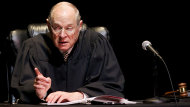If the Supreme Court breaks down along its usual ideological lines on the vote on the health care law, Justice Anthony Kennedy -- known as the swing vote on the court -- could be the one to decide whether the government can require almost every American to buy health insurance or pay a fine.
When the court hears the case on the Affordable Care Act in March, advocates, experts and the media will parse every question from Kennedy, hoping for a hint of his views on the merits of the case.
The central focus will be on the individual mandate, the key provision that requires individuals to buy health insurance by 2014 or pay a tax penalty.
As its principal argument that Congress has the authority to enact the mandate, the administration relies on the Commerce Clause of the Constitution that says in part: "The Congress shall have power ... to regulate commerce with foreign nations, and among the several states and with the Indian tribes."
Critics of the health care law argue that while Congress has substantial power to regulate interstate commerce, it may not compel people into the marketplace and force them to buy a product.
Paul D. Clement, a lawyer from Bancroft PLLC, who is representing the 26 states challenging the law, writes in court briefs, "In the over 200 years that Congress has sat, it has never before attempted to exercise its Commerce Clause power in this manner."
Kennedy, 75, who was appointed to the court in 1988 by Ronald Reagan, has often been the deciding vote in big cases. But the Supreme Court has never heard a case quite like the challenge to the Affordable Care Act, and predictions regarding the final vote count have varied significantly.
Many were surprised when two appellate court judges, with sterling reputations in conservative circles, voted to uphold the constitutionality of the mandate when a similar challenge came before their courts.
The case -- with an unprecedented 5½ hours of argument allotted to it -- could defy expectations.
